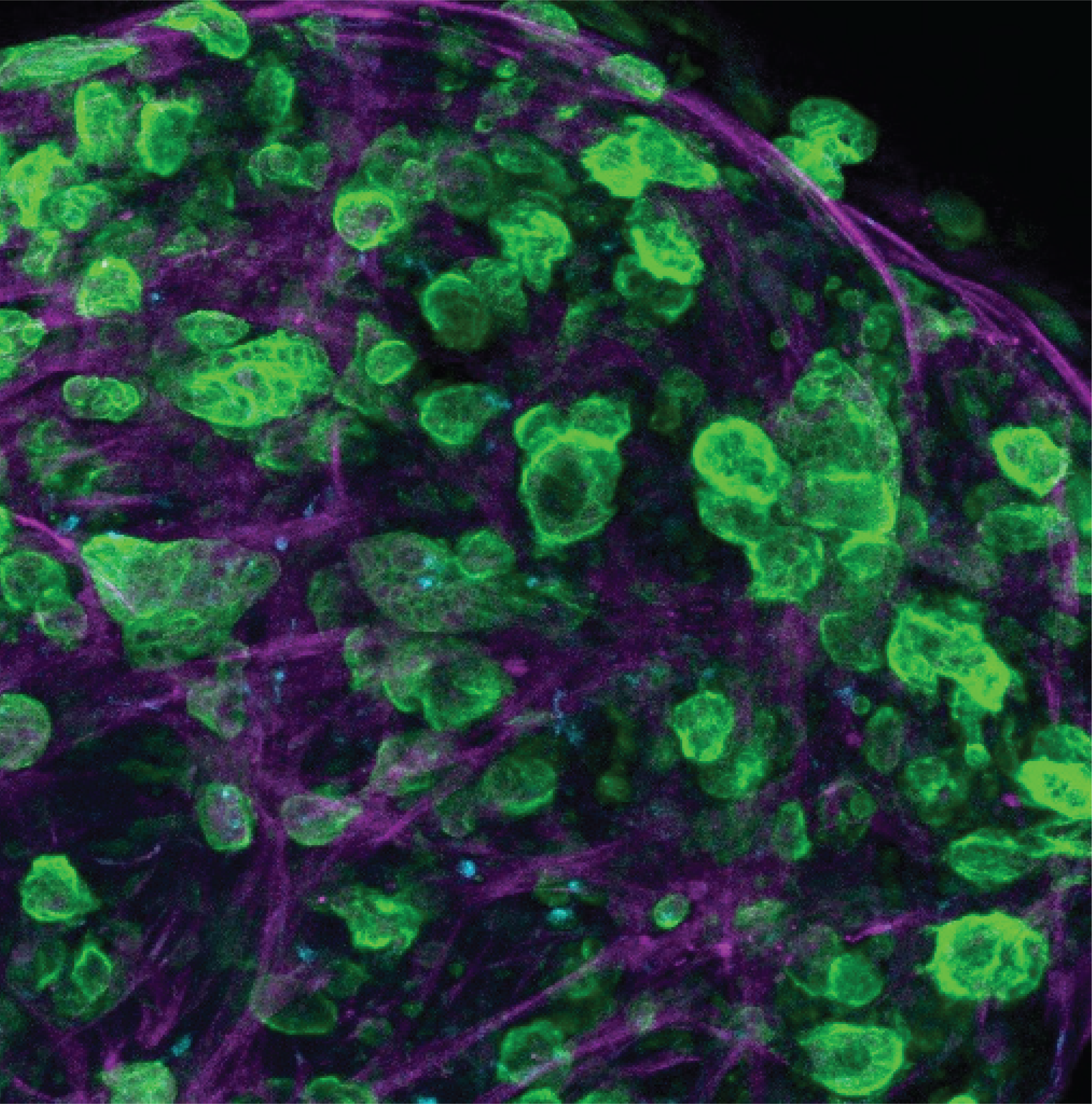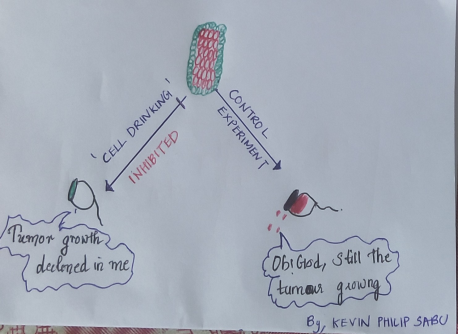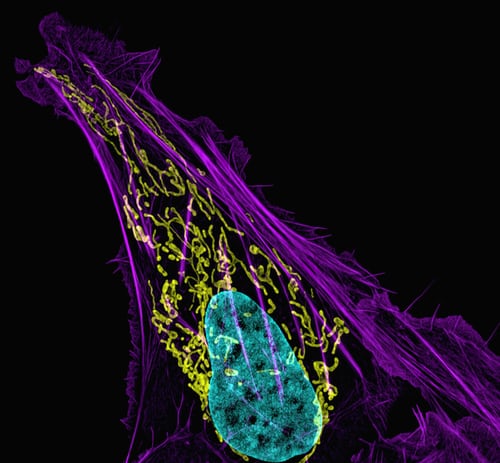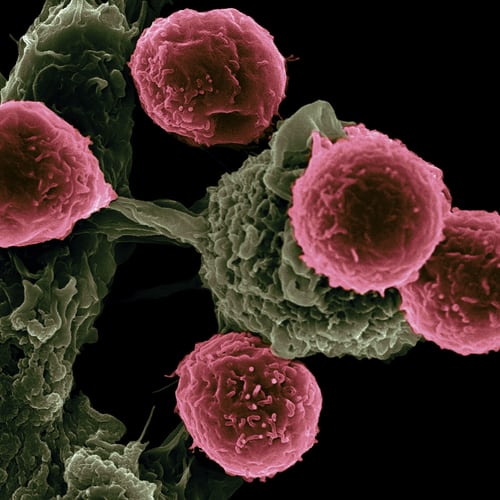Starving Your Neighbours: Shrinking Pancreatic Tumours
Review
Kevin Philip Sabu
 Pancreatic Ductal AdenoCarcinoma
Pancreatic Ductal AdenoCarcinoma
Shutting off the transfer of nutrients from the neighbouring cells to the tumour is an effective way of controlling tumour growth in pancreatic cancer. Rapidly growing pancreatic tumours obtain nutrients by capturing nutrients from nearby cells. This article discusses therapeutic techniques based on this strategy.
Tweet
The pancreas is an organ that lies in the lower abdomen. This organ discharges enzymes that assist in digestion and secretes blood sugar-regulating hormones. Pancreatic cancer is assessed as one of the heftiest cancer assassins globally. Out of 53,000 Americans diagnosed, 41,000 of them succumbed to pancreatic cancer.
“There are two major reasons why pancreatic cancer is difficult to attack. The first reason is that it is possible to diagnose it at a late stage of the disease. The second is that we need better drugs; the current therapeutics are not that effective,” says Cosimo Commisso, the senior author of the study. The pancreatic tumour is exposed to a minimal nutrient environment. But they procure nutrients from the thick connective cells that surround them. So, starving these cells will hinder tumour growth.
Commisso’s group started focusing on the methods that can be used to starve these neighbouring cells that promote cancer growth. If the neighbours are starved, nutrient supply for tumour cells by them can be inhibited. The amount of amino acid glutamine present is inversely proportional to the nutrient uptake.
When there is a deprivation of the amino acid Glutamine, it stimulates the nutrient uptake in cancer cells. This nutrient performs two functions. They serve as a source of amino acid associated with the surrounding neighbouring cells’ well-being and provide amino acids that enhance tumour growth.
Initially, they blocked this nutrient uptake process in those cells by blocking the enhancement of cytosolic Ca2+ by treating them with a certain chemical. This 'cell drinking’ inhibited cells, and the tumour cells were switched to the model animal (mice). The result obtained was unforeseen. The tumour growth was slowed in the test mice in which the nutrient uptake was inhibited compared to the other mice in which it was not inhibited.
Peeling off these nutrient-supplying cells completely will only advance the spreading of the tumour. So, if targeted drugs that can inhibit this nutrient uptake are launched, it will be a breakthrough. In their long-term examination, they also pointed out the molecules which trigger this nutrient uptake from the neighbouring cells of the tumour, which is an additional advantage in drug discovery. So, this investigation can be a breakthrough for many of the devastating malignancies such as lung, prostate, bladder, and colon cancers.
 Made by Author
Commisso’s team has found that systemic inhibition of macropinocytosis by administration of EIPA leads to a tremendous decline in tumour growth in a xenograft mouse model of PDAC. Cancer-associated fibroblasts in these cells also had considerable effects of growth deprivation when treated with EIPA because this chemical inhibits the nutrient uptake of the tumour cells.
Made by Author
Commisso’s team has found that systemic inhibition of macropinocytosis by administration of EIPA leads to a tremendous decline in tumour growth in a xenograft mouse model of PDAC. Cancer-associated fibroblasts in these cells also had considerable effects of growth deprivation when treated with EIPA because this chemical inhibits the nutrient uptake of the tumour cells.
 Credits: National Cancer Institute, Unsplash
"We are going to test whether cutting off the nutrient supply will actually be combined with chemotherapies, in the hope of creating a new and improved way of treating patients”, Commiso said. They are operating on drugs that can target these neighbouring cells. With that, they will have an entrance to the tumour so that chemotherapy can effectively control pancreatic cancer.
Credits: National Cancer Institute, Unsplash
"We are going to test whether cutting off the nutrient supply will actually be combined with chemotherapies, in the hope of creating a new and improved way of treating patients”, Commiso said. They are operating on drugs that can target these neighbouring cells. With that, they will have an entrance to the tumour so that chemotherapy can effectively control pancreatic cancer.
 Credits: Unsplash
References
Credits: Unsplash
References
Yijuan Zhang, M. Victoria Recouvreux, Michael Jung, Koen M.O. Galenkamp, Yunbo Li, Olga Zagnitko, David A. Scott, Andrew M. Lowy, Cosimo Commisso. Macropinocytosis in Cancer-Associated Fibroblasts is Dependent on CaMKK2/ARHGEF2 Signaling and Functions to Support Tumor and Stromal Cell Fitness. Cancer Discovery, 2021; candisc.0119.2020 DOI: 10.1158/2159-8290.CD-20-0119
SBP’s Cosimo Commisso talks pancreatic cancer; DOI: https://youtu.be/sPONPdbSjl4
Kevin Philip Sabu is a final year MSc Zoology student in the School of Life Sciences, University of Madras. He is currently pursuing a Master's degree, investigating the different bioassays of secondary metabolites isolated from gut bacteria. His research interests are in the diverse fields of Biology and Organic Chemistry. Apart from science, he loves hanging out and reading books.
signup with your email to get the latest articles instantly